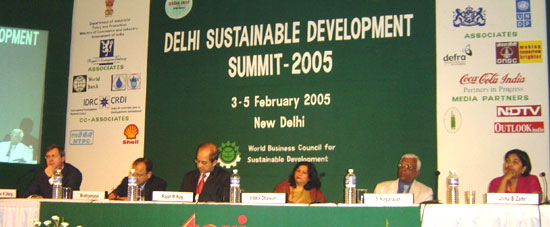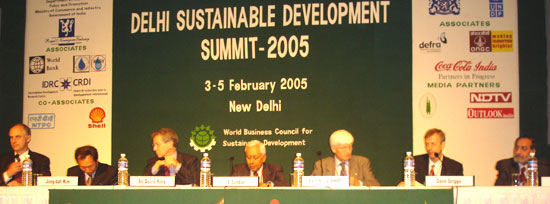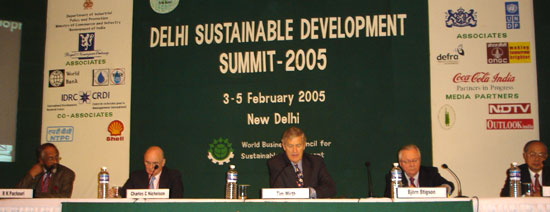| |
| |
5 February, Saturday |
 |
|
| Plenary Session 5 - Agriculture for sustainable
livelihoods |
| Agriculture
is central to attaining the MDGs on account of its direct
linkages with poverty reduction, access to food, and health.
This session will focus on the kinds of initiatives required
for the sustainable growth of this sector to strengthen this
linkage. It will address issues related to infrastructural
development, natural resource management, market access and
nutritional aspects of crop choices, covering specifically
areas related to investments, pricing and trade policies,
research and development and its extension, and linkages with
other rural development programmes and policies.
 |
Left
to right: Mr Henrique H. Ubrig, President - South Asia,
E.I. DuPont India Private Limited, India; Dr Mruthyunjaya,
Director, National Centre for Agricultural Economics &
Policy Research; Mr Rajat M Nag, Director General, Mekong
Department, Asian Development Bank, Philippines; Dr Vibha
Dhawan, Executive Director,TERI, New Delhi; Dr S Nagarajan,
Director, Indian Agricultural Research Institute, New
Delhi; Dr (Ms) Usha Barwale Zehr, Joint Director of Research,
Maharashtra Hybrid Seeds Company, India
|
| |
|
 Dr Mruthyunjaya
Dr Mruthyunjaya
Director, National Centre for Agricultural
Economics & Policy Research
'Natural disasters impact differently on different livelihood
groups. The poor are the most vulnerable.' |
| |
|
|
 Dr S Nagarajan
Dr S Nagarajan
Director, Indian Agricultural Research
Institute, New Delhi
'Injecting both capital and technology in rain-fed areas
will help achieve sustainable livelihoods.' |
|
|
| |
|
|
| |
|
 Mr Henrique H. Ubrig
Mr Henrique H. Ubrig
President - South Asia, E.I. DuPont India
Private Limited, India
'Old assumptions are no longer valid; the key is innovation.
There is no technological quick fix.' |
| |
|
|
|
| |
|
| Plenary
Session 6 - Science and technology for global sustainability |
This
session will focus on issues that keep the technology gap
open, addressing factors that are key in turning advances
in new technologies into advances for mankind. It will examine
issues related to identifying priorities for R & D in
developing countries, promoting indigenous technological development,
funding mechanisms apart from research subsidies, grants and
tax-breaks to industry, and governance of technological development
to promote innovation and knowledge sharing. In all of this,
it will highlight how collaboration amongst industry, researchers,
governments, regulators, media and civil society organization
can be strengthened.
 |
Left
to right: Dr Klaus S Lackner, Ewing-Worzel Professor of
Geophysics, Earth & Environmental Engineering, Columbia
University, New York; Prof. Jong-dall Kim, Professor,
School of Economics and Trade, Director, Research Institute
for Energy, Environment and Economy, Center for Solar
City Daegu, Kyungpook National University, Daegu, Korea;
Prof. Sir David King, Chief Scientific Adviser to HM Government
and Head of the Office of Science and Technology, UK;
Mr S Sundar, Distinguished Fellow, TERI, New Delhi; Prof.
Sir Chris Llewellyn Smith FRS, Director, The United Kingdom
Atomic Energy Authority (UKAEA), UK;Dr Dave Griggs, Director
- Climate Research, Hadley Centre for Climate Prediction
and Research, UK; Mr Kiran Karnik, President, National
Association of Software and Service Companies (NASSCOM),
New Delhi, India
|
| |
|
 Dr
Dave Griggs
Dr
Dave Griggs
Director - Climate Research, Hadley Centre
for Climate Prediction and Research, UK
'During reconstruction in the wake of the recent tsunami,
there is opportunity to take into account increased risks
due to climate change.' |
| |
|
|
 Prof.
Sir Chris Llewellyn Smith FRS
Prof.
Sir Chris Llewellyn Smith FRS
Director, The United Kingdom Atomic Energy
Authority (UKAEA), UK
'If we can bring down the use of energy, we can save on
the investment in producing capital to pay for energy.' |
|
|
| |
|
|
| |
|
 Prof.
Sir David King
Prof.
Sir David King
Chief Scientific Adviser to HM Government and Head of
the Office of Science and Technology, UK
'In West Africa, a new kind of polio is taking off. Given
the current developments in science and technology, this
is unnecessary.' |
| |
|
|
|
| |
|
| Plenary
Session 7 - Concluding Session |
 |
| Left
to right: Dr R K Pachauri, Director-General,
TERI, New Delhi ; Sir
Charles C Nicholson,Group Senior Advisor, BP Plc, London,
UK; Senator Tim Wirth, President, United Nations Foundation,
Washington DC, USA; Mr Björn Stigson, President,
World Business Council for Sustainable Development, Switzerland;
Prof. Akio Morishima,Chair of the Board of Directors,
Institutefor Global Environmental Strategies, Japan |
| |
|
 Senator
Tim Wirth
Senator
Tim Wirth
President, United Nations Foundation, Washington DC, USA
'I cannot tell you how important Indian leadership has
been to us! We are optimistic because of the kind of leadership
we see here.' |
| |
|
|
 Dr
R K Pachauri
Dr
R K Pachauri
Director-General, TERI, New Delhi
'We must correct the existing imbalances in the fields
of education, health, transport, etc. These are the factors
that create the urban–rural divide.' |
|
|
| |
|
|
| |
|
 Prof.
Akio Morishima
Prof.
Akio Morishima
Chair of the Board of Directors, Institutefor
Global Environmental Strategies, Japan
'I hope that TERI will become a core place where data
can be accessed.' |
| |
|
|
 Sir
Charles C Nicholson
Sir
Charles C Nicholson
Group Senior Advisor, BP Plc, London,
UK
'Business is business and must remain so, but in line
with social goals. Business must provide skills, markets,
products, and services to improve the quality of life
and prospects for millions.' |
|
|
| |
|
|
| |
|
 Mr
Björn Stigson
Mr
Björn Stigson
President, World Business Council for
Sustainable Development, Switzerland
'We live in a world increasingly being shaped by sustainable
issues. No part of society can find solutions to these
issues on its own.' |
| |
|
|
|
|
| |
|

